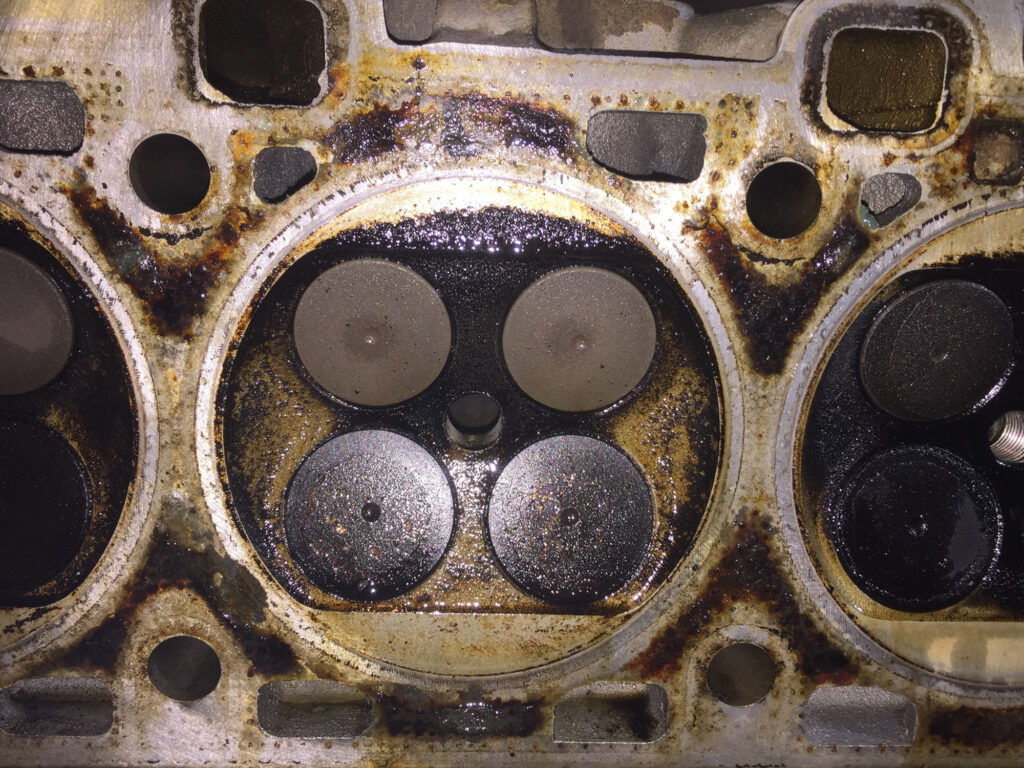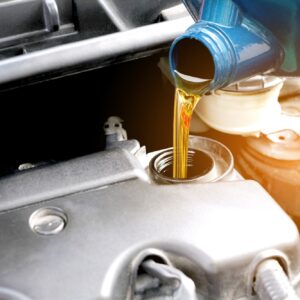Carbon buildup is the sort of problem you can’t prevent, but it is one you can mitigate and fix with a little bit of know-how. Because of this, it’s important to familiarize yourself with what carbon buildup is, what problems it can cause for you and your vehicle, and what you can do to deal with it.
What Is Carbon Buildup and Why Does It Build Up in the Engine?
Simply put, carbon buildup refers to the black soot-like deposits of carbon that form during incomplete combustion. This soot collects and hardens over time, potentially clogging important components such as cylinders and oil pathways.
But how exactly does carbon build up in the engine?

Carbon deposits are a byproduct of a process as unavoidable as combustion. There’s no real way to prevent them from forming, but there are some habits that can lead to increased carbon buildup.
- Using low-quality fuel
- Using premium fuel in a regular fuel engine (there are TSBs about this)
- Driving at low speeds
- Slamming the throttle abruptly
- Too many short trips
- Improper or poor maintenance
What Are the Signs of Carbon Buildup in the Engine?
There are many ways carbon buildup can affect your vehicle, causing all sorts of performance problems. Here are some of the signs that there’s carbon buildup in your engine:
Cold Stalling
Carbon buildup on the intake valves restricts airflow in the engine and absorbs octane, and this becomes a bigger problem in winter because carbon becomes more rigid in cold temperatures. Not only will your engine stall more frequently, but you’ll also have a more difficult time starting your vehicle and getting the engine running in the first place.
Engine Misfires
Another common symptom associated with carbon buildup is engine misfires. Carbon buildup on the spark plugs prevents them from producing sufficient spark in the engine cylinder. This may result in sluggish and poor acceleration.
Misfires have the potential to cause permanent damage to your engine, and they don’t just go away on their own. They may also cause the vehicle computer to log a trouble code and illuminate the check engine light.
Detonation or Pinging on Acceleration
As carbon builds on the cylinder head and the piston crown, it takes up room in the combustion chamber and increases the compression so that when the engine is hot, detonation/pinging can result. Believe it or not, using 93 octane premium fuel in an engine that specifies 87 octane fuel will cause carbon to form because 93 octane fuel burns slower than 87 octane fuel. As unburned fuel accumulates, it forms carbon and causes problems.
Weak Engine Performance
If you’ve noticed significant dips in the performance and power of your vehicle, there’s a good chance there’s carbon buildup in the engine. Performance dips typically include lower RPM, a stalling engine, and a general loss of both speed and power.

How to Minimize Carbon Buildup in Your Engine
Unfortunately, there’s no surefire way to prevent carbon from building up in your engine. Carbon deposits are a product of combustion, which is a necessary and unavoidable process for any functional vehicle that’s powered by fuel.
However, just because you can’t stop carbon buildup doesn’t mean there aren’t things you can do to minimize carbon buildup instead. If you’re keen on learning how to decrease the overall production of carbon deposits in your vehicle, follow these simple steps.
Don’t Use Low-Quality Fuel
Powering your vehicle with low-quality fuel leads to poor, incomplete combustion. Not only does this negatively impact your vehicle’s performance, but it’ll also cause greater amounts of carbon to gather and clump inside the engine.
Premium fuel has an octane rating of 91-94, so you might think it’s a cut above regular oil which has an octane rating of around 87 but prolonged use of higher octane fuels can cause carbon deposits to increase. Sometimes, higher octane fuels can cause an engine designed for lower octane fuel to stumble when first started cold.
Sometimes, higher octane fuels can cause an engine designed for lower octane fuel to stumble when first started cold.
–Richard McCuistian, ASE Certified Master Automobile Technician
That being said, low quality 87 octane fuel can also cause carbon deposits and detonation/ping. Use fresh, good quality fuel and select the octane rating your vehicle owner’s manual specifies.
Perform Regular Oil Changes and Warm the Engine
Don’t put off getting your oil changed on time, and don’t make a lot of very short trips. Always warm the engine up completely before shutting it off.
Replace Bad Spark Plugs
The more you drive a vehicle, the more worn out the spark plugs become and misfires will always leave some fuel in the cylinder, which forms carbon over time. This tends to happen because of carbon buildup, leading to a variety of performance issues such as engine stalling and poor acceleration. The best way to prevent this from happening is to replace your spark plugs when they go bad or when you reach the recommended mileage with your vehicle.
Standard-issue spark plugs should be changed every 30,000 to 50,000 miles, but some vehicles might have spark plugs designed to last. These spark plugs are often made of iridium and should be changed every 60,000 to 150,000 miles instead.
How to Get Your Hands on New Spark Plugs to Reduce Carbon Buildup
It’s best to stop driving your vehicle if you have bad spark plugs because you’ll face problems like incomplete combustion and reduced fuel economy. It can also affect the environment, as your ride burns more fuel, releasing more pollutants into the air.
Thankfully, you can get replacement spark plugs that fit your vehicle with just a few clicks when you shop at CarParts.com.
The best part? You can get your hands on some replacement parts without leaving your house. Simply use your mobile device or computer to visit our website. Use our vehicle selector and input your vehicle’s details to narrow down the catalog to compatible spark plugs
We make sure to get our auto parts from some of the most trusted manufacturers in the industry. Every item in our catalog is vetted by a team of professionals to guarantee both quality and longevity. You won’t have to worry about your new spark plugs failing you any time soon.
On top of that, our warehouses are strategically located all over the US. This means you’ll receive your order in as fast as two business days. So, don’t hold off on getting functional spark plugs to improve your driving experience. Shop now to get spark plug replacements at unbeatable prices!
Any information provided on this Website is for informational purposes only and is not intended to replace consultation with a professional mechanic. The accuracy and timeliness of the information may change from the time of publication.




























